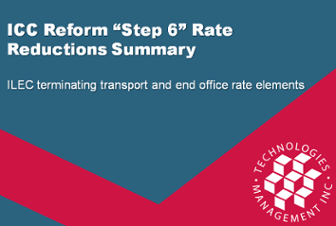 Today: FCC Public Inspection File Requirements, FCC on GAO Lifeline Report, Louisiana Internet Access At Public Airports, New York Court Says Sprint Must Pay Taxes, California To Examine Poles/Conduits/ROW
Today: FCC Public Inspection File Requirements, FCC on GAO Lifeline Report, Louisiana Internet Access At Public Airports, New York Court Says Sprint Must Pay Taxes, California To Examine Poles/Conduits/ROW
 The Regulatory Mix will not be published Monday, July 3rd or Tuesday, July 4th.
The Regulatory Mix will not be published Monday, July 3rd or Tuesday, July 4th.
The Mix will be back on Wednesday, July 5th.
FCC Public Inspection File Requirements
The Office of Management and Budget has approved the FCC’s elimination of two public inspection file requirements: (i) the requirement that commercial broadcast stations retain in their public inspection file copies of letters and emails from the public; and (ii) the requirement that cable operators maintain for public inspection the designation and location of the cable system’s principal headend. The effective date of these rule changes is June 29, 2017. Click here to see the FCC’s Public Notice. Removing these requirements will enable commercial broadcasters and cable operators to make their entire public inspection file available online and eliminate the need to maintain a local public file.
FCC On GAO Lifeline Report
FCC Commissioners have issued statements on the Government Accountability Office’s (GAO) Lifeline Report. Chairman Pai noted that the GAO could not confirm 36% of the subscribers it reviewed. He said, “Last year, I led an investigation into the Lifeline program that revealed serious weaknesses in federal safeguards. Today’s GAO report confirms what we discovered then: Waste, fraud, and abuse are all too prevalent in the program. Commission staff and the Office of Inspector General have already been developing recommendations to better safeguard taxpayer funds. I stand ready to work with my colleagues to crack down on the unscrupulous providers that abuse the program so that the dollars we spend support affordable, high-speed broadband Internet access for our nation’s poorest families.” Commissioner Clyburn’s statement said, in part, “Some may use the limited findings of this report as justification to cut back on the Lifeline program even further, but that would be catastrophic for those most in need. The answer is not denying access to those who cannot afford connectivity and access to critical services like 911, the next steps should include rolling up our sleeves and addressing any imperfections that remain.” Commissioner O’Rielly’s statement said “I am not surprised by the revelations in GAO’s latest examination of the Lifeline program. It’s why I sought to address fraud, waste and abuse prior to expanding the scope of the program and pushed unsuccessfully for a host of needed reforms, including the adoption of a budget for the program. I have little confidence, at this point, in the changes adopted by the Commission over the last number of years, or in the ability of USAC to stem the tide of problems. More significant reform is needed, including completely rethinking USAC.”
California To Examine Poles/Conduits/ROW
At its June 29th Agenda Meeting, the PUC voted to examine whether California’s existing stock of 4.2 million utility poles and “thousands of miles” of underground conduits have sufficient space to support ubiquitous, competitive, and affordable telecommunications services, while keeping the pole and conduit infrastructure safe for residents, workers, and the environment. The PUC said it will also consider creating a database that will allow stakeholders to share key information about utility poles with each other and the PUC. Click here for the full Press Release and watch for our upcoming TMI Briefing when the PUC Order is released.
Louisiana Internet Access At Public Airports
Act No. 322 signed by the Governor on June 22, 2017, and effective August 1, 2017, provides that any public airport may provide free access to broadband Internet, as defined by the FCC, solely to patrons at the airport. Such broadband Internet must be procured in accordance with applicable state and local procurement laws and rules.
New York Court Says Sprint Must Pay Taxes
The Supreme Court of New York has ruled that Sprint must pay both the City Utility Tax and the City Unincorporated Business Income Tax (UBT). Sprint had appealed to the Court seeking a declaration that it should be classified as a utility subject only to the Utility Tax. The key issue before the Court was whether Sprint, an unincorporated business, is a vendor of utility services subject to both the Utility Tax and UBT, or a utility subject to the Utility Tax but exempt from the UBT. ["Sprint Communications Company, L.P. v. The City of New York Department of Finance," Nos. 154499/14, 4165]
_____________________________________________________________________
The Regulatory Mix, TMI’s daily blog of telecom related regulatory activities, is a snapshot of PUC, FCC, legislative, and occasionally court issues that our regulatory monitoring team uncovers each day. Depending on their significance, some items may be the subject of a TMI Briefing.
Compliance Reporting | Technologies Management Inc.
Listen to TelecomReseller's 1/30/17 podcast on FCC form 477 with TMI's Hal Stinger!





